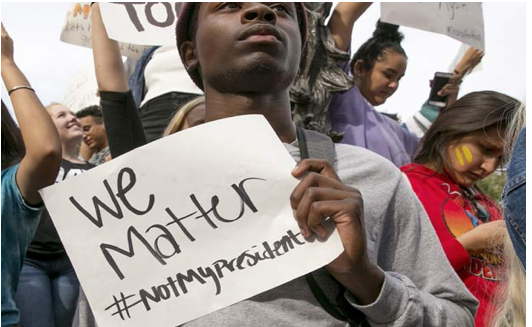CommentsURBAN PERSPECTIVE--"The White House judges nominees on the merits of their character and not on the clients they once represented as counsel.” This was the terse statement that #45 Trump issued in defense of the instant and loud criticism of his pick, Eric Dreiband to head the Justice Department’s Civil Rights Division.
The division has been described as the gold standard for civil rights enforcement and direction in the nation. It’s an appropriate designation considering that for much of the last half century the CRD has set the tone and the tempo for forcing, monitoring and implementing federal civil rights initiatives.
The criticism of Dreiband is more than well-deserved. He made his reputation not as a civil rights attorney, law professor specializing in civil rights, or working with a state or federal agency tasked with civil rights legislation and enforcement. He made his reputation doing just the opposite, as a corporate attorney who specialized in trying to beat back age, gender and racial discrimination lawsuits against corporations. This makes him Trump’s perfect choice to not strengthen, but gut the federal government’s flagship civil rights agency.
His nomination comes at the mid-point of Trump’s first year in the Oval Office. This makes it the perfect time to take a hard look at just what Trump has done to wreak even more damage on civil rights.
His unrelenting vow to get a Muslim travel ban has got much of the ink and attention in his war on civil rights and liberties. But he has wasted no time in quietly inflicting as much damage as he can in other areas of civil rights enforcement and compliance. Just hours after he set foot in the White House he deleted the White House webpage on civil rights.
The Obama administration had proudly cited and filled the White House website with loads of information about his administration’s initiatives on civil rights. Trump’s quick deletion of the page was more than symbolism.
His first nomination out the box was Alabama Senator Jeff Sessions to head the Justice Department, the umbrella agency that the Civil Rights Division is under. The message was clear, a total remake of the department was a top priority for Trump.
Sessions hit the ground running. He demanded the delay, if not the end, of federal consent decrees on police misconduct, a new war on low level drug offenders, silence on criminal justice reforms, and a full-throated endorsement of private prisons. Given Sessions intense dislike of the Voting Rights Act, enforcement of the law is even more imperiled.
For decades, the heart of the EPA, Education, and Housing, and Labor departments, has been their civil rights compliance units. They have monitored, overseen, and most importantly enforced, compliance by corporations on fair labor practices, to eliminate racial disparities in school districts, to reduce toxic hazards in inner city neighborhoods, and to end housing discrimination.
Trump’s proposed funding cutbacks and his unstated policy of benign neglect of the compliance units sends the strong message that civil rights enforcement in federal agencies is a thing of the past.
Civil rights organizations no longer can automatically look to the Supreme Court, or other federal courts, for the redress of inequities. Trump made good on his long-standing promise to appoint judges who are the spitting legal image of Antonin Scalia to the high court with his pick of Neil Gorsuch.
In the short space of time he’s been on the high court, he’s been a civil rights opponent’s dream come true. He has joined his ideological twin, Clarence Thomas in conservative rulings on same sex, gun-owners’ rights, and the right of religious institutions to government funding. The issues directly impact on civil rights law.
The SCOTUS is only the start of Trump’s civil rights remake of the courts. With little fanfare, he named nearly a dozen judges to fill vacancies on lower courts in several judicial districts. His picks read like a Who's Who from the ultra-conservative Heritage Foundation. They are conservative, with deep ties to the GOP, and corporations. They have shown no evidence of any legal sympathy to civil rights law and labor protections. There are hundreds more vacancies on the federal judiciary that Trump will try and fill in the months to come.
The picks aren’t likely to vary one bit from the template of judges that he deems his ideal; judges that are conservative, pro-corporate, and hostile to labor and civil rights. They will speedily be confirmed and will have a deep influence on law, public policy and, especially, the criminal justice system for decades to come.
This is only the start. In the coming months, there will be renewed challenges to the Voting Rights Act, affirmative action, Housing discrimination, public-school funding, corporate abuses, environmental, and consumer regulatory issues. The challenges will come in the courts and within federal agencies. Trump’s truly ugly mid-year record on civil rights tells exactly what the horrific outcome could be. It won’t get any prettier.
(Earl Ofari Hutchinson is an author and political analyst. He is an associate editor of New America Media. His forthcoming book, The Trump Challenge to Black America (Middle Passage Press) will be released in August. He is a CityWatch contributor.)
-cw
















